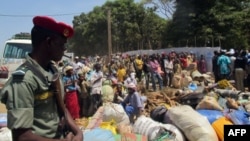The number of Central Africans fleeing to neighboring Cameroon has fallen drastically - an indication that violence may be subsiding in the Central African Republic (CAR). But many of the refugees in Cameroon are reluctant to return home out of fear of poverty, hunger and having to rebuild their lives with an uncertain future.
Najat Rochdi, a United Nations coordinator in Cameroon, said the last major surge of Central African refugees into Cameroon was in February following a spate of farmer-herder violence that saw 50,000 people displaced. But she said generally numbers had started to dwindle even before then.
She said the influx of Central African Refugees has been reduced and because of all the United Nations relief agencies and assistance from the government of Cameroon and international donors they were able to contain the humanitarian crisis.
Zamballa Noezo, a 52 year old barber, was among last month’s new arrivals in Cameroon. He said he left the northern CAR town of Bria when soldiers came in to quell escalating violence between herders and farmers and life became unbearable. He said he has found happiness and peace in Cameroon.
Those who have been in Cameroon a longer time said they were better off here than at home.
40 year-old Mamma Ruifah came to Gado Badzere - one of Cameroon’s largest refugee camps - a year ago. She said she lost everything in CAR and was not thinking of going back to her country.
She said she still has bad memories of how her husband, brother-in-law and two daughters were killed in front of her and all of her property was destroyed. She said she preferred to sell beans and ground nuts here to be able to take care of her remaining daughter.
But life as a refugee remains very hard.
Zamballa Noezo said the main difficulty for refugees in Cameroon was access to basic health care.
He said access to health centers and schools for their children was difficult. He said children and women suffered a lot as they had to cover long distances in search of drinkable water while men also covered long distances to get water for their cattle.
Male refugees also complain women and children are given more attention by humanitarian agencies.
Anne Njob of the Cameroon's Red Cross said there were many more women and children in need.
She said although they did not discriminate between men and women when attending to their health needs, they could not allow pregnant women and breast feeding mothers to do labor intensive work because they needed special care.
The UNHCR says some 900,000 people were displaced after violence erupted in 2013 in the Central African Republic, when a coup sparked sectarian bloodshed. About half of the displaced are now living in Cameroon, Chad, the Democratic Republic of Congo and the Republic of Congo - most under very tough conditions.
Host communities in poorer localities, like here at Gado Badzere, have complained of difficulties sharing their limited resources with the refugees.
The UN’s Najat Rochdi said both the refugees and the host communities were in urgent need of more humanitarian assistance.
